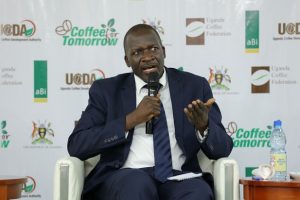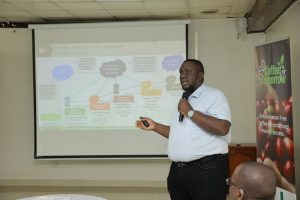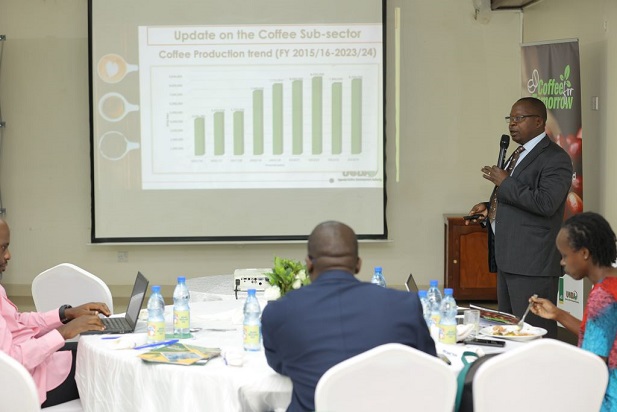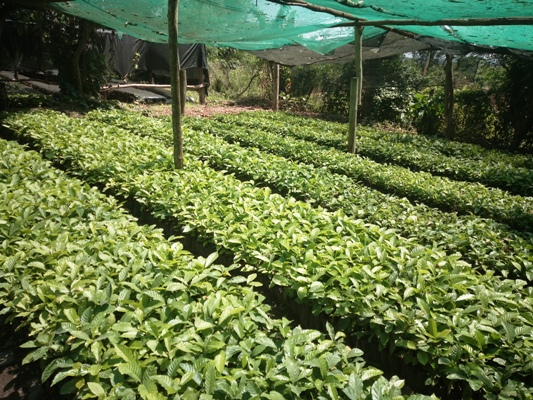Robert Nangatsa, the Extension Manager at UCDA, addressing journalists
The European Union Regulation on Deforestation-Free Products (EUDR) and Corporate Sustainability Due Diligence Directive requirements have ignited debate on why Uganda is focusing on the EU market for its coffee instead of looking for alternative markets.
Other stakeholders want Government to intensify efforts to grow domestic coffee consumption.
However, in the short and medium term, the EU market remains crucial for Uganda. Coffee remains Uganda’s leading cash crop and a top foreign exchange earner. According to Uganda Coffee Development Authority (UCDA), Uganda earned a record US$1.44 billion (Shs5.3 trillion) from coffee exports in 2023. The EU which comprises of 28 countries accounted for 66% of Uganda’s coffee exports in 2023.
UCDA says coffee exports to the EU have averaged 63% for the last 10 years.
On 5th December 2022, the European Union (EU) Parliament approved the EU Regulation for deforestation-free products (EUDR) to ensure supply chains remain free from products that cause deforestation.
The deforestation regulation which goes into effect from 30th December 2024 requires that exporters of commodities such as coffee, cocoa and their derivatives submit specific documentations to export to the EU market.
Robert Nangatsa, the Extension Manager at UCDA, says the only way out to continue accessing the EU market is to comply with EUDR guidelines. This can only be achieved by registering all coffee farmers and other value chain actors so that the coffee is traced up to the farm.
He was speaking at a breakfast meeting held at Hotel Africana on Tuesday, September 3, 2024 to engage journalists and raise awareness about EUDR compliance.
“The EU market is crucial for Uganda’s coffee industry, accounting for about 63% of our exports. It is imperative that we comply with the EUDR to maintain access to this market,” said Nangatsa.
He explained that the EUDR requires exporters to submit detailed land-use maps and due diligence statements to ensure deforestation-free production. “This means that we must provide geographic coordinates of production plots to ensure traceability and verify deforestation-free practices,” he added.
The EU regulation is in sync with the Uganda National Coffee Act 2021 which stresses the need for traceability in the coffee sub-sector.
“Even before the EUDR came into force, UCDA had developed a Geospatial Monitoring and Evaluation System and Farmer Registration App to register farmers and other value chain actors. “These innovative tools will empower coffee exporters to adhere to EUDR regulations and ensure the sustainability of our coffee sector,” said Nangatsa, adding that registration of value chain actors is necessary for traceability of coffee along the entire value chain.
Dr. Gerald Kyalo, the Director of Development Services at UCDA, is confident that most of the farmers will have been registered by 30th December 2024. He says registration of farmers is set to start next week.
It is expected that by December 2024 the country will have mapped close to 1 million of the estimated 1.8 million coffee households.
Dr. Kyalo expressed gratitude for the Shs13.9 billion allocated by the Government and expressed confidence in receiving the full Shs35 billion to set up the traceability system.
He explained that registration involves capturing farm geo-locations and farmer details to ensure traceability.
“The registration is for traceability to know where your farm is located and how big it is. This will help in tracing the farm where a certain batch of export is coming from,” he told reporters.
For farmers with over 10 acres, polygons of their farms will be created for record purposes, enabling easy tracing of exported coffee.
“As long as you have 10 acres and above, we shall take polygons of the garden. We take different coordinates and end up with polygons. For those below 10 acres, coordinates will be enough,” he said.

Kyalo noted that registration will be an ongoing process to accommodate new entrants into the coffee value chain. “The registration process will be continuous and done by UCDA. Our officers will update the register annually to include new farmers.”
He stressed that the EU regulation requires evidence of no deforestation, which necessitates tracing coffee back to the farmer. “The regulation requires that we show evidence that our coffee doesn’t contribute to deforestation. To do this, we need to trace our coffee back to the farmer and have a register of all farmers, gardens, and coordinates.”
Samson Emong, representing the National EUDR Task Force, emphasised the critical need for accurate reporting on the campaign’s progress, stressing that Uganda’s coffee industry faces significant risks if it fails to meet the EU’s deforestation and sustainability standards.
With the EU market accounting for a significant share of Uganda’s coffee exports, Emong said the industry’s compliance with EUDR is crucial to maintaining market access.

The National Taskforce has established a robust framework to support the industry’s transition, including capacity-building programs, awareness campaigns, and partnerships with key stakeholders. He said the EU market is crucial because Uganda can’t easily switch to other markets because of the logistics involved.





